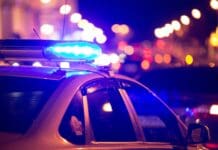Earlier today, I posted the following statement: “In battle, you do what you gotta do, live, call 911 and deal.” The 911 part of the formula is no small point. All your go-to gun gurus and lawyer friends (oxymoronic as that sounds) agree: you must call the cops immediately after a shooting. That’s the only way you can establish yourself as the victim rather than the aggressor. It’s also critical for guiding the first responders to your 10-40, and pre-identifying yourself so you don’t get yo’ ass capped by the good guys. Only there’s a fly in the cellular ointment. The rabbi sent me a link to a CNN story that raises the alarm about raising the alarm by calling 911 from your cell . . .
Calling 911 from a cell phone will indeed put you in touch with local emergency services. However, they might not be quite as local as you need.
For instance, in Oakland, California, all 911 calls from cell phones are routed to the California Highway Patrol. That’s great if I’m reporting a car accident on the Bay Bridge. But it might not be as efficient if my house is on fire.
In fact, the Oakland Police Department goes so far as to advise: “DO NOT CALL 911 from a cell phone. When you call 911 from a cell phone, the call is routed to the California Highway Patrol (CHP). The CHP then has to reroute the call to your local police or fire dispatcher, losing precious time.”
Apparently, you need to check with your local police to see if punching 911 on your cell puts you in immediate contact with your local police.
Do I need to say this? Don’t call 911 to find out if 911 is the best number to call from your cell after a self-defense shooting. Check the web or ring your local police’s main number during business hours and ask if there’s a special cell number to call for 911 emergencies.
Either that or forget it. What are the odds you’ll dial anything other than 911 when you’ve got more adrenalin in your system than a teenage boy calling a girl for a date? Meanwhile, there’s something you need to remember should you have to call the po-po after a shooting.
When calling 911 from a cell phone, say where you are first.
If you’re unsure of your exact address, at least name the town or neighborhood and glance around quickly to see whether there’s something you can say you’re near (such as the name of a nearby business or street, or a noticeable landmark). Then quickly explain the nature of the emergency.
Before you get into the situation details, give your cell phone number. If you get disconnected, emergency services might not know how to call you back — but with your number, they can either re-establish contact or enlist your wireless carrier’s help in finding you.
Combining that advice with your basic post-shooting cell phone protocol, a call would go something like this:
“My name is XXXX . I was just involved in a self-defense shooting. I’m near the corner of Norfolk and Broad Street. I’m wearing a black ski jacket and glasses. My cell number is XXX XXXX. I had to shoot. My life was in danger.”
Again, don’t farm out this job to someone else. Do not answer any questions from the operator about what happened. Just keep repeating “My life was in danger. I had to shoot.”
Alternatively, once you’ve given the vital info, put your cell down (without hanging up) and do the other things you need to do (tell witnesses not to leave, continue scanning for threats, calm your friends or family down).
A post-shooting call could well be the most important phone call of your life. Get it right.





Another great post. The information about putting the cell phone down without hanging up is very important. Having both hands free, and not holding an attention diverting device up to your head, will likely keep you 'in the game' and in the correct mindset to deal with any additional threats that may come.
Here is an issue, though. We know that whatever you say over the 911 line is recorded — if the cell phone has not been disconnected, then EVERYTHING being said continues to be recorded. In a later criminal trial, a zealous prosecutor can use those recordings to paint you in a way that helps his case — likewise, a plaintiff's attorney can use those recordings to hurt you in a civil trial.
I'd give all of the information you suggested (including the call-back number) and hang up. Why make it easier for some anti DA to nail you to the wall later, using your own words to do so?
Most newer cell phones contain a GPS chip that, if not diabled by the user, provides coordinates of caller. This allows first responders/ emergency services personnel to quickly locate or track source of injured party. Response time uncertainties should be minimized as any 911 receiver would have instant access to location of emergency.
Read the CNN article. The system can take as long as six minutes to "find" a GPS phone.
dbjack46: in THEORY ONLY, my friend! Remember: Budgets have been cut severely. This is one feature that may have fallen by the wayside because of… I know 2 situations specifically where it 'was' going to be implemented but never was, the other… services passed hands to a NOC (Network Operation Center) that didnt [did NOt] have this feature. Its rarer than u think! so DONT COUNT ON IT.
Comments are closed.